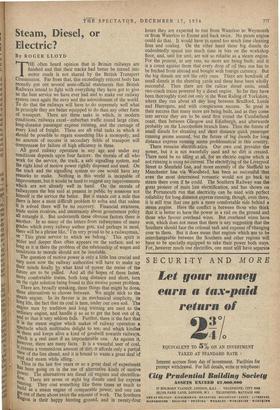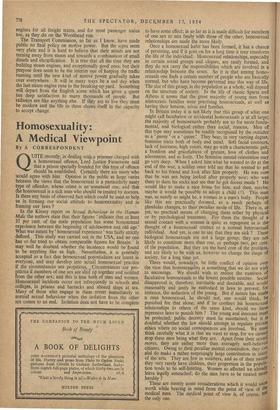Steam, Diesel, or Electric?
By ROGER LLOYD THE often heard opinion that in Britain railways are finished and that. their tracks had better be turned into motor roads is not shared by the British Transport Cbmmission. Far from that, this exceedingly reticent body has recently put out several semi-official statements that British Railways intend to fight with everything they have got to give us the best service we have ever had and to make our railway system once again the envy and the astonishment of the world. To do that the railways will have to do supremely well what in principle they are better equipped to do than any other form of transport. There are three tasks in which, in modem. Conditions, railways excel—suburban traffic round large cities, long-distance passenger express running, and the carriage of every kind of freight. These are all vital tasks in which it should be possible to regain something like a monopoly; and no amount of success in secondary fields of transport will compensate for failure of high efficiency in these. All good railway operation in any age and under any conditions depends upon four factors: the morale of all who work for the service, the track, a safe signalling system, and the right kind of motive power rightly disposed and used. On the track and the signalling system no one would have any remarks to make. Nothing in this world is incapable of improvement, but it would be hard to suggest any improvements which are not already well in hand. On the morale of railwaymen the less said at present in public by someone not himself in the service the better. But it stands out a mile that there is here a most difficult problem to solve and that unless it is solved there will be no recovery. Financial straitness, trade union rivalries, and uncertainty about government policy. all entangle it. But underneath these obvious factors there is another. In so many of the letters from railwaymen of many grades which every railway author gets, and perhaps in most, there will be a phrase like, ' I'm very proud to be a railwayman,' or ' This great service to which we belong.' This spirit is wider and deeper than often appears on the surface, and so long as it is there the problem of the relationship of wages and Conditions to morale should not be insoluble.
The question of motive power is only a little less crucial and very soon now the railway authorities will have to make up their minds finally by what kind of power the trains• of the future are to be pulled. And ' all the hopes of these faster. More comfortable trains, both long distance and short, turn on the right solution being found to this motive power problem. There are, broadly speaking, three things that might be done, three alternatives to choose between. We might stick to the Ream engine. In its favour is its mechanical simplicity, its long life, the fact that its coal is here, tinder our own soil. The engine men by tradition and long training are used to the ordinary engine, and handle it so as to get the best out of its and so that it very seldom fails. Further, there is the fact that It is the steam engine which makes of railway operation a Pectacle which multitudes delight to see, and which kindles 'U them and keeps alive a kind of goodwill towards railways, \Mich is a real asset if an imponderable one. As against it, however, there are many facts. It is a wasteful user of coal, It creates a tremendous amount of dirt, it affords only a partial View of the line ahead, and it is bound to waste a great deal of Coal and steam while idling. k Thus in the last five years or so a great deal of experiment has been going on in the use of alternative kinds of motive Rower. The alternatives are diesel oil engines and electrifica- ,..."11. There are seven or eight big diesels used for express running. They cost something like three times as much to build as a steam engine of comparable power, and one can hours they are expected to run from Waterloo to Weymouth or from Waterloo to Exeter and back twice. No steam engine could do that. It would have to spend too much time cleaning fires and coaling. Oh the other hand these big diesels do undoubtedly spend too much time in bits on the workshop floor, and, unit for unit, are not so reliable as a steam engine. For the present, at any rate, no more are being built; and it is a count against them that every drop of oil' they use has to be fetched from abroad and bought with foreign currency. But the big diesels are not the only ones. There are hundreds of small diesels in the shunting yards and these have been wholly successful. Then there are the railcar diesel units, small two-coach trains powered by a diesel engine. So far they have been thoroughly tried out only in the West Riding of Yorkshire, where they run about all day long between Bradford, Leeds and Harrogate, and with conspicuous success. So great is their success that many more are being built, and as they coma into service they are to be used first round the Cumberland coast, then between Glasgow and Edinburgh. and afterwards probably on the Lincolnshire branch lines. Thus the future of small diesels for shunting and short distance quick passenger running seems assured, but the future of big diesels for long distance express running seems problematical in this country. There remains electrification. Our own coal provides the power, but it is not wastefully used and no dirt is created. There need be no idling at all, for an electric engine which is not running is using no current. The electrifying of the Liverpool Street to Shenfield line, and more recently of the Sheffield to Manchester line via Woodhead, has been so successful that even the most determined romantic would not go back to steam there even if he could. The Southern Railway was the great pioneer of main line electrification, and has shown on the Portsmouth run that electricity can be used with perfect reliability for long distance express running, though, even there, it is still true that one gets a more comfortable ride behind a steam ,engine. Here the conflict is between those who think that it is better to have the power in a rail on the ground and those who favour overhead wires. But overhead wires have won, which does not mean that there is any suggestion that the Southern should face the colossal task and expense of changing over to them. But it does mean that engines which are to be interchangeable between the. Southern and other regions will have to be specially equipped to take their power both ways. For, however much one electrifies, one must still have separate engines for all freight trains, and for most passenger trains too, as they do on the Woodhead run.
The Transport Commission, so far as I know, have made public no final policy on motive power. But the signs seem very plain and it is hard to believe that their minds are not turning away from steam and towards a combination of small diesels and electrification. It is true that all the time they are building steam engines, and exceptionally good ones, but their purpose does seem to be the interim one of keeping the traffic running until the new kind of motive power gradually takes over everywhere. It will in many ways be a sad day when the last steam engine runs to the breaking-up yard. Something will depart from the English scene which has given a queer but deep satisfaction to many thousands of people. But railways are like anything else. If they are to live they must be modern and the life in them shows itself in the capacity to accept change.



































 Previous page
Previous page